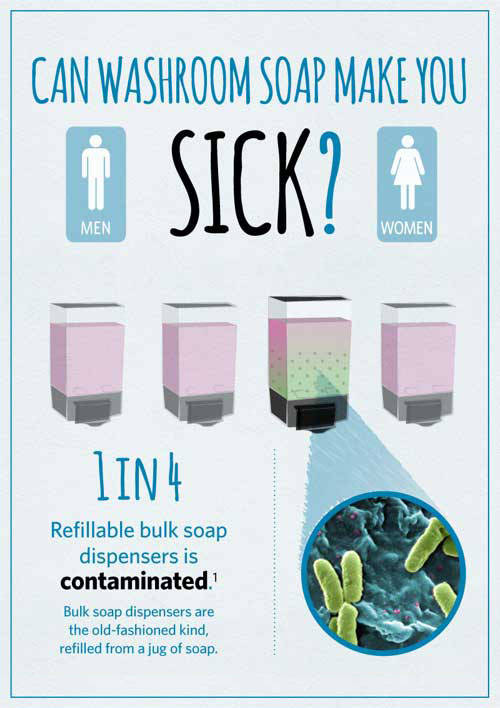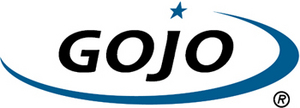GOJO Raises Awareness of Public Health Risk Due to Refillable Bulk Soap Dispensers
Published 06-18-13
Submitted by GoJo Industries

well-being, GOJO is working to educate
businesses and the public against the
use of refillable bulk soap dispensers,
which can increase disease-causing
bacteria on hands.
(Marketwired) - GOJO Industries is raising awareness of the potential human health risks from refillable bulk soap dispenser contamination that can be avoided. Driven by a commitment to advance social well-being, GOJO is working to change the industry by educating against the use of refillable bulk soap dispensers and recommends the sealed systems that many facilities are moving towards as a solution.
Refillable bulk soap dispensers require that soap is poured into an open reservoir. Because the reservoir is open, bacteria can contaminate the soap leading to a bacterial biofilm on the inside of the dispenser. This can lead to bacterial contamination of new soap added to the dispenser.
Three published articles including the March 2011 edition of the Journal of Environmental Health reveal that 25 percent of public bulk soap dispensers are contaminated by unsafe levels of bacteria.1 A follow up study in Applied and Environmental Microbiology released in May 2011, reports handwashing with soap from these dispensers can increase disease-causing bacteria on hands.2 This study concludes hands can carry over 25 times more bacteria after washing with contaminated soap than before washing, and bacteria left on hands can be transferred to surfaces.
The most recent study published in the January 2012 issue of Biofouling, reveals that biofilms grow in refillable bulk soap dispensers, causing recontamination even after cleaning with bleach.3 The study suggests avoiding recontamination by replacing refillable bulk dispensers with sealed refill systems.
The JEH study was conducted by Dr. Charles P. Gerba and colleagues from the University of Arizona. The AEM study was conducted by scientists from GOJO, BioScience Laboratories in Bozeman, Mont., and the University of Arizona. The Biofouling study was conducted by scientists from the Center for Biofilm Engineering at Montana State University and GOJO.
"The sanitary sealed systems have many advantages," said Dave Shumaker, GOJO microbiologist. "The soap refills are sanitary sealed at the manufacturer and easily snap into place inside the dispenser. Empty refills snap right out and are ready to be recycled. New soap is never refilled or exposed to the environment, unlike refillable bulk soap. This helps to prevent contamination of germs in the air or from fingers of the person doing the refilling."
Nicole Koharik, global sustainability marketing director, said GOJO sealed refill systems align social and environmental considerations.
"Sealed systems are consistent with the social well-being practice of promoting human health and the environmental practice of reducing waste through recycling. Sealed-refill systems are an example of how social and environmental factors can mesh," she said. "People sometimes assume reusing is more sustainable, but as the studies revealed, reuse can introduce human health risks. GOJO® SANITARY SEALED™ refills are safer and more sustainable than bulk soap dispensers."
About GOJO
GOJO Industries, Inc., inventors of PURELL® Instant Hand Sanitizer, distributes PURELL hand sanitizer in consumer and away-from-home markets throughout the world. In addition, GOJO manufactures and distributes a full line of products under GOJO® and PROVON® brand names. GOJO has a 64-year history of leadership in improving well-being through hand hygiene and healthy skin. GOJO has products and programs to kill germs on hands and solve skin care-related problems in a variety of markets, including healthcare, foodservice, food processing, manufacturing, automotive, education, government and military. GOJO is a privately held corporation headquartered in Akron, Ohio, with offices in the United Kingdom, France, Australasia, Japan and Brazil. Visit GOJO at gojo.com.
Image with caption: "No More Bulk Infographic (GOJO Industries)." Image available at: www.GOJO.com/NoMoreBulkSoap.
1 Chattman, M, Maxwell, S., Gerba, C. Occurrence of Heterotrophic and Coliform Bacteria in Liquid Hand Soaps From Bulk Refillable Dispensers in Public Facilities. Journal of Environmental Health 2011.
2 Zapka, C., Campbell, E., Maxwell, S., Gerba, C., Dolan, M., Arbogast, J., Macinga, D., Bacteria Hand Contamination and Transfer after Use of Contaminated Bulk-Soap-Refillable Dispensers. Applied and Environmental Microbiology 2011; 77:9 2898-2904.
3 Lorenz, L., Ramsay, B., Goeres, D., Fields, M., Zapka, C., Macinga, D., Evaluation and remediation of bulk soap dispensers for biofilm, Biofouling 2012; 28:1: 99-109.

GoJo Industries
GoJo Industries
GOJO Industries, Inc., inventors of PURELL® Instant Hand Sanitizer, distributes PURELL in consumer and away-from-home markets throughout the world. In addition, GOJO manufactures and distributes a full line of products under GOJO® and PROVON® brand names. GOJO has a 64-year history of leadership in improving well-being through hand hygiene and healthy skin. GOJO products and programs kill germs on hands and solve skin care-related problems in a variety of markets, including healthcare, foodservice, food processing, manufacturing, automotive, education, government and military. GOJO is a privately held corporation headquartered in Akron, Ohio, with offices in the United Kingdom, France, Australasia, Japan and Brazil.
More from GoJo Industries

